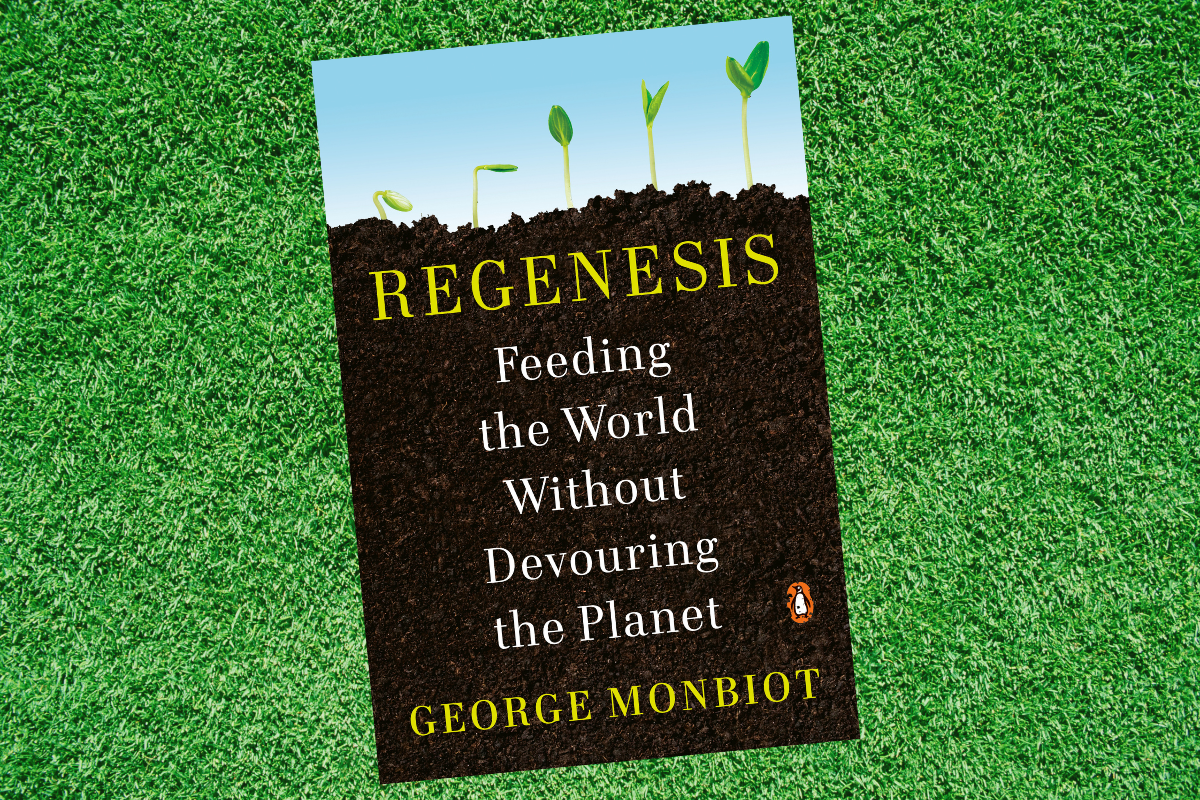by Scott Smith
Move over, Thanos. The genocidal monster of the Marvel Universe can’t hold a candle to the likes of Old MacDonald, who had a farm. “Farming,” says environmental activist George Monbiot, “is the most destructive human activity ever to have blighted the Earth.”
In his latest book, Regenesis: Feeding the World Without Devouring the Planet, Monbiot persuasively makes the case that land use, in particular the way we farm, is the most important of all environmental questions, the issue that will determine whether Earth systems survive or perish. “Farming is the world’s greatest cause of habitat destruction, the greatest cause of the global loss of wildlife, and the greatest cause of the global extinction crisis.”
Strong stuff, but Monbiot backs up his stark warning with an impressive, if not downright daunting, array of data. The farming quote above is supported by no less than seven footnotes. So if you’re averse to citations, gird yourself, though if you’re looking for fresh facts to win any argument about the need to change the way we eat and the way the world makes food, this deeply researched book is your meal ticket. Gardeners will especially enjoy the opening chapter, an engrossing account of the ground underneath our feet, the source of 99 percent of the calories we consume. “The soil might be the most complex of all living systems. Yet we treat it like dirt,” Monbiot writes. You know you’re making an important contribution to ecological literature when Bill McKibben, the scholarly author of The End of Nature, says “I learned something on every page.”
Thankfully, all is not dark in Monbiot’s worldview. After scaring the E-I-E-I-O out of you in the first half of the book, in the second half he presents a series of fascinating case studies about innovators who are striving to find workable, equitable solutions to the overlapping problems caused by modern agriculture.
In profiling the farmers and scientists who seek to transform food and how we grow it, Monbiot admirably refrains from portraying any as providing the ultimate solution. And to be fair, Monbiot does not see farmers as supervillains but more like victims–of outmoded conventional wisdom, of misguided government policies, of inhumane corporate interests.
Monbiot, the author of several bestselling books and creator of top TED talks and viral videos (one, on natural climate solutions co-presented with Greta Thunberg, has been viewed more than 60 million times), reserves his harshest criticism for those who do see easy fixes where there are none. He chides locavores for failing to recognize that it’s better all around to grow some food, such as soy, far away and to ship it to where it’s needed, for instance. He’s scornful of the pastoralists who promote an “escapist” fantasy of livestock farming. “This will come as a shock to many: there might be no more damaging farm product than organic, pasture-fed beef.” Writing of the popular TV shows in his native UK, he says, “there’s probably more money being made in this country by talking about sheep farming than doing it.”
A vegan, Monbiot says it would be ideal if there was a planetary shift to a diet based on beans, lentils and nuts, supplemented by locally grown fruit, vegetables and herbs. But to feed 10 billion people without destroying the planet, he cheers on the researchers developing perennial grains, the farmers growing crops without fertilizers and pesticides and, most crucially, the scientists creating entirely new, “farmfree” foods. Most promising among them is a protein powder made by fermenting bacteria. Monbiot makes a pancake from this microbial protein, and proclaims it “the beginning of the end of most agriculture.”
It’s Monbiot’s hope that this “greener revolution” will end the livestock farming and slaughterhouse industries, restore soil health and free up vast tracts of land for climate-change mitigation and the rewilding of species big and small on every continent. “The age of Extinction could be succeeded by the age of Regenesis.”
That should be the hope of us all.
Penguin Books
$18 paperback
234 pages
Regenesis Manifesto
To allow human beings and the rest of life on Earth to flourish, we should:
- Become food-numerate
- Change the stories we tell ourselves
- Limit the land area we use to feed the world
- Minimize our use of water and farm chemicals
- Launch an Earth Rover Program to finely map the world’s soils
- Enhance fertility with the smallest possible organic interventions
- Research and develop a high-yield agroecology
- Stop farming animals
- Replace protein and fat from animals with precision fermentation
- Break global corporations’ grip on the food chain
- Diversify the global food system
- Use our understanding of complex systems to trigger cascading change
- Rewild the land released from farming

